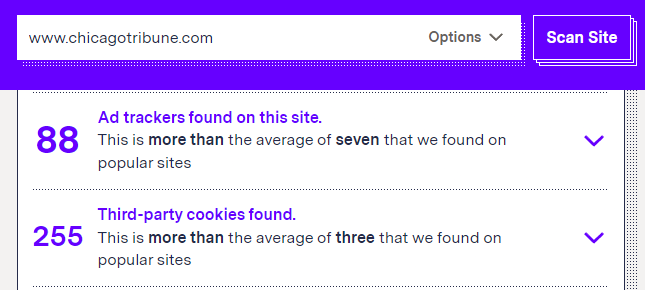The headline is a bad question, because they are all selling your privacy. This isn’t paranoid speculation but the reality of our digital lives. This reality, which is made up of third-party cookies, ad trackers, and digital fingerprinting, is one that many of us willingly accept. You visit a website, click the “Accept Cookies” button, and get on with it.
But have you ever wondered the extent to which some of the most visited websites in the world engage in this kind of behavior? Would it surprise you to learn that mainstream media (MSM) sites are some of the worst offenders when it comes to selling your privacy?
Below is a ranking of major media websites and their tracking activities. It is ordered beginning with the most prolific offenders. Household names like the Chicago Tribune, New York Post, and Washington Post have been caught red-handed employing hundreds of trackers to harvest every morsel of browsing data that they can sink their teeth into. These alleged bastions of truth are, in reality, bastions of greed focused on monetizing your behavior.
343 total trackers at the Chicago Tribune, for example! For context, the average website uses 3 third-party cookies and 7 ad trackers.
Take special note of #1 and #9, as they both use a particularly nefarious technique called “canvas fingerprinting,” which bypasses cookie blockers and tracks your behavior across sites without your knowledge or consent. (We’ll talk more about that later.)
Chicago Tribune: 343 trackers
- 255 third-party cookies
- 88 ad trackers
- Uses canvas fingerprintingNY Post: 331 trackers
- 241 third-party cookies
- 90 ad trackersThe Guardian: 274 trackers
- 195 third-party cookies
- 79 ad trackersWashington Post: 236 trackers
- 163 third-party cookies
- 73 ad trackersCNN: 223 trackers
- 192 third-party cookies
- 31 ad trackersNY Times: 157 trackers
- 100 third-party cookies
- 57 ad trackersFox News: 104 trackers
- 82 third-party cookies
- 22 ad trackersUSA Today: 92 trackers
- 21 third-party cookies
- 71 ad trackersNBC News: 50 trackers
- 12 third-party cookies
- 38 ad trackers
- Uses canvas fingerprinting
- Captures user keystrokes via Taboola
(one webpage on NBC contained this keylogger)
The Truth About Cookies
Cookies are little bits of data that get stored on your device from websites that you visit, and they come in two distinct varieties.
First-party cookies are created by the person/company/website that you visit. They are useful and generally enhance user experience. They do things like remember your login information and keep track of the items you have in your shopping cart.
Third-party cookies are created by external entities. According to data privacy laws, these are considered “non-essential” cookies. Along with ad trackers (embedded scripts or pixels), they are used for tracking, profiling, and advertising purposes.
Put simply, they monitor your behavior—sometimes across multiple websites. Your data may then be used to build comprehensive profiles that attempt to predict what you might do in the future by analyzing what you’ve done in the past.
Generally, this information is used to serve personalized ads to you. It is possible for some of these cookie companies to link the data they’ve captured to your email address. And sometimes your data is packaged and sold to advertisers, private companies, or political campaigns.
One of the most common third-party cookies sends information to a company called AtData (formerly TowerData), which is known to sell data about voters to political campaigns. This cookie was found on all nine major media websites featured in the list above.
BTW, for those of you counting on Google to eliminate third-party cookies from Chrome, I have news for you. They retracted their elimination plan because the loss of revenue would be too great.
Canvas Fingerprinting
Some MSM websites, including the Chicago Tribune and NBC News, use a technique called “canvas fingerprinting,” which is used to identify a user even if they block third-party cookies.
Fingerprinting is used to monitor behavior across multiple websites. It works by secretly drawing an image on your browser so that it can identify, track, and build a profile using your browsing data.
This means that even if you block third party cookies, and opt out of all non-essential cookies, you will, against your will and without your knowledge, be monitored.
I want to be clear about something: the mainstream media doesn’t care about your privacy. They care about monetizing you. Bad as this is, the problem is bigger than privacy concerns.
When the institutions that shape public opinion generate profit from clicks and views, and when clicks and views are maximized not by truth but through controversy and sensationalism, we’ve crossed a dangerous line.
This is not okay. And we need to stop pretending that it is.
Note on data collection
Data was collected via “Blacklight,” which is a publicly available tool developed by The Markup. Blacklight works by visiting a websites homepage and one additional page (chosen at random) with a headless browser. The browser uses custom coded software that probes the webpages for seven distinct types of data surveillance. Depending on the day and particular webpage you visit, cookie count can vary. In my investigation, NBC News ranged from 50 trackers to a whopping 191, for example. Furthermore, a particular webpage on NBC News contained a keylogger, whereas the other pages that we analyzed on NBC did not. You can learn more about The Markup here, and you can try Blacklight for yourself here.


